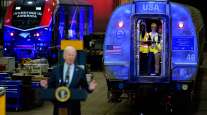Perspective: Harnessing the Power of Trucking
[Stay on top of transportation news: Get TTNews in your inbox.]
Throughout our lives, we rely on a multitude of goods and services to prosper as individuals and as a nation. But no industry is more central to that story than trucking.
Our entire economy is tethered to trucking.
The security of this country relies on trucks and the people who drive them.
The American way of life is reflected in our industry’s values — where being a part of something bigger than oneself not only defines who we are as individuals, but also how we’re perceived by others.
Such reflection is emblematic of an industry that moves America forward.

Spear
The growth and strength of our industry depends on our understanding of the environment in which we have to operate. Truckers know what it means to take the road less traveled. They know at times that road can be unforgiving.
In today’s political environment, changing public policy is no different. It’s challenging and complex, requiring patience and resolve. This week, American Trucking Associations comes together for its annual Management Conference & Exhibition to plot that path forward.
Our task in San Diego is clear. The work our membership does this week will guide our industry’s future.
As an association that puts its members, industry and country first, we will always adhere to the value of working with anyone who is willing to work with us. Our policies and priorities are driven by facts rather than rhetoric. The relationships we have with the House and Senate — and with both parties — are real, strategic and powerful. They ensure our industry has a seat at the table as policymakers in Washington and beyond make decisions on issues that matter to us.
These relationships are evident in the work we’re doing in Washington. Take infrastructure, for instance. ATRI reports that our industry loses $74.5 billion each year sitting in traffic, which equates to 425,000 truck drivers sitting idle for an entire year, emitting a staggering 67 million tons of carbon dioxide.
But make no mistake: Our association will not sit idle as America’s infrastructure crisis grows. That’s why we led a movement of business and labor organizations to create and launch a national ad campaign that was praised by pro-infrastructure advocates — including Speaker Nancy Pelosi — and feared by obstructionists in Congress who lack the courage to address our nation’s ailing Highway Trust Fund.
And lawmakers’ dependence on us to get infrastructure reform across the finish line can be seen in Congress. I’ve testified before the House Ways and Means Committee and Transportation and Infrastructure Committee to explain why our infrastructure funding proposal, the Build America Fund, is the most viable, efficient and effective mechanism available today to restore our nation’s roads and bridges. Our members have gone before Chairman Peter DeFazio’s T&I committee to testify on infrastructure, and again last month on the mounting burden tolls place on our industry.
Trade is another example. In improving the 1994 North American Free Trade Agreement, where labor and environmental standards are woefully inadequate, an upgrade is a no-brainer. But in Washington, even the simplest things can be the hardest. That’s where truckers come in.
We’ve been working with this administration and Congress, as well as our Mexican and Canadian counterparts, to highlight the overwhelming benefits of enacting the United States-Mexico-Canada trade pact — and the alarming economic impact should Congress fail to do so. Our members have been center-stage, recently testifying before the powerful Senate Finance Committee to explain how integral this issue is to trucking and the economy.
Just saying “no” gets you nothing. Helping all sides get to “yes” is what ATA is all about, and it’s why we’re confident this agreement will pass and bring economic stability to our industry for years to come.
Strengthening our workforce also is a top priority. Last year, the national truck driver shortage eclipsed 60,000 drivers and will swell to more than 160,000 by 2028. Ignoring these facts is not an option, and poaching talent from other carriers is not a sustainable growth strategy.
We’re working this issue on multiple fronts, starting with improved access to health care and wellness programs for our workforce, and by expanding programs such as Hiring our Heroes and Transition Trucking to expand our talent pool. The DRIVE-Safe Act continues to gain bipartisan momentum in Congress. If we can train our nation’s 18- to 20-year-olds to fight our wars, then we can certainly train them to cross state lines in a Class 8.
Those from our industry making the trip to San Diego are doing so because they care about this industry, and they recognize that our collective goals are just as important as any personal interests. ATA’s unified presence represents a powerful force. We are now looking well beyond the hood, and together, we’re shaping an industry that puts our employees, the motoring public, our customers’ needs and our nation, first.
Chris Spear is president and CEO of American Trucking Associations.
Want more news? Listen to today's daily briefing:





